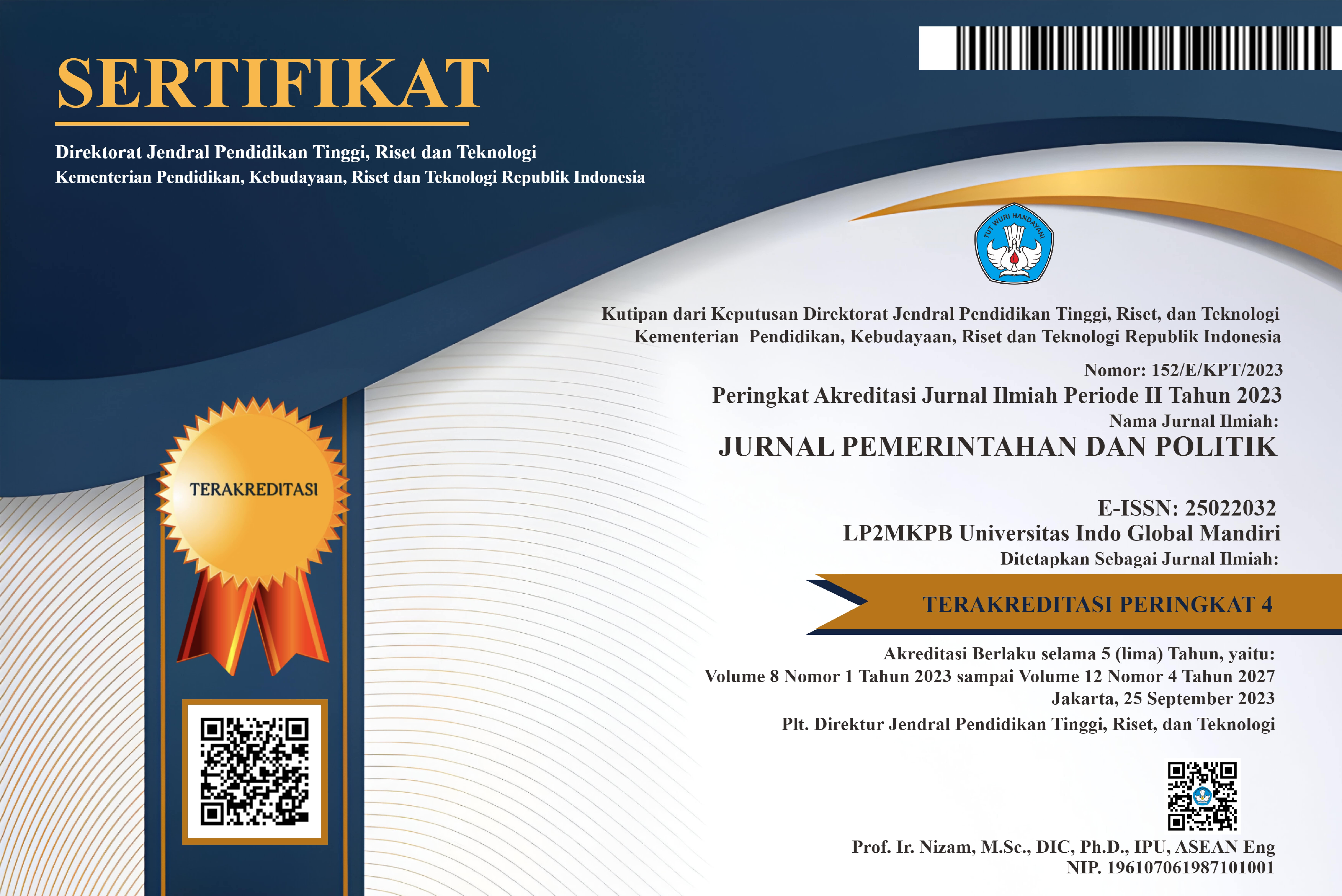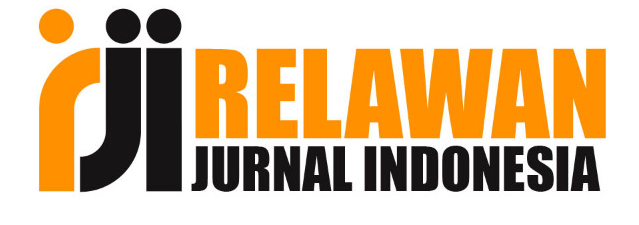Gerakan Sosial Anak Muda dalam Proses Demokrasi Elektoral 2024: Studi Gerakan Protes atas Politik Dinasti
DOI:
https://doi.org/10.36982/jpg.v9i4.4362Keywords:
Youth Social Movement, Electoral Democracy, Political DynastyAbstract
This study aims to explore the youth social movements in the electoral democracy process of 2024. The social movement was triggered by the various situations that are related to the issue of political dynasty which is seen as producing a sense of injustice and a threat to democracy existence. This study uses a qualitative approach. The data is obtained and osberved from various social media reports on the protests against political dynasty issue. This study shows that the protest movement was carried out by more than 700 universities spread across various regions in Indonesia. The protest movement on the streets was dominated by the youth. This study formulates that the social movements carried out involving various framings and repertoires in building narratives for rejecting the political dynasty and demanding a systemic change. Actors in this social movements use social media as a tool for mass mobilization. However, the main challenge in this social movement comes from a strong cultural power system and a complex of democratic dynamics, which affect the results of the protest movement that carried out. Through these two challenges, the protest movement against political dynasty issue has not been so strong enough in accomodating, influencing and changing the political system will by the protesters. The contribution of this study is to expand the research issue related to new social movement that focuses on youth as movement’s actors and reveal the layered barrier or challenge of social movement in the context of Indonesia’s democracy.
References
Alonso, A. (2012). Repertório, segundo Charles Tilly: História de um conceito. Sociologia & Antropologia, 2(3), 21–41. https://doi.org/10.1590/2238-38752012v232
Ananda, A. I. (2023). The influence of political dynasty on the democracy climate. Constitutional Law Society, 2(1), 9–17. https://doi.org/10.36448/cls.v2i2.37
Anderson, B. R. O. (1972). The Idea of Power in Javanese Culture. Cornell University. https://sci-hub.se/downloads/2019-12-17/57/anderson2019.pdf
Asrul, F.R., Wijayanto, Hidayat, N.H. (2024). Dinamika gerakan konfederasi serikat pekerja seluruh Indonesia pasca Orde Baru. Jurnal Pemerintahan dan Politik, 9(1). 71-77. https://drive.google.com/file/d/1N3WyINacId_GA5bss7NefRrvPP9YRkx5/view.
Bublitz, M. G., Escalas, J. E., Lteif, L., Nardini, G., Peracchio, L. A., Rank-Christman, T., & Woodrow, S. (2024). We’re on the rise: How social movements support youth well-being. Journal of the Association for Consumer Research, 9(2), 143–154. https://doi.org/10.1086/728645
Buechler, S. M. (2015). New social movement theory. In The Blackwell Encyclopedia of Sociology. Wiley.
https://doi.org/10.1002/9781405165518.wbeosn022.pub2
Buechler, S. M. (2019). New social movement theory. In The Blackwell Encyclopedia of Sociology. Wiley.
Ciurel, D. (2023). The framing of protest. Professional Communication and Translation Studies, 11, 7–15. https://doi.org/10.59168/BFJJ3729
Chock, C. S. (2012). Youth and social movements: Key lessons for allies. SSRN Electronic Journal. https://doi.org/10.2139/ssrn.2199531
Earl, J., Maher, T. V., & Elliott, T. (2017). Youth, activism, and social movements. Sociology Compass, 11(4). https://doi.org/10.1111/soc4.12465
Effendi, W. R. (2018). Dinasti politik dalam pemerintahan lokal studi kasus dinasti Kota Banten. Jurnal Trias Politika, 2(2), 233.
https://doi.org/10.33373/jtp.v2i2.1471
Faslah, R., & Yanti, N. (2020). Kerajaan Islam: Sejarah Politik Islam Klasik di Indonesia. Mauizhah: Jurnal Kajian Keislaman, 10(2), 193-214.
Grinspun, D., Wallace, K., Li, S.-A., McNeill, S., Squires, J. E., Bujalance, J., D’Arpino, M., De Souza, G., Farshait, N., Gabbay, J., Graham, I. D., Hutchinson, A., Kinder, K., Laur, C., Mah, T., Moore, J. E., Plant, J., Ploquin, J., Ruiter, P. J. A., … Zhao, J. (2022). Exploring social movement concepts and actions in a knowledge uptake and sustainability context: A concept analysis. International Journal of Nursing Sciences, 9(4), 411–421. https://doi.org/10.1016/j.ijnss.2022.08.003
Kriesi, H., Koopmans, R., Duyvendak, J., Giugni, M. (1995). New social movements in Western Europe. A comparative analysis. London: Routledge. https://doi.org/10.4324/9780203501115
Lee, S. (2020). Social media use and social movements and protests. In The International Encyclopedia of Media Psychology (pp. 1–6). Wiley. https://doi.org/10.1002/9781119011071.iemp0316
Martínez-López, R., Bemol-Ambrosio, L., & Sumano-Ramírez, E. (2022). Ser joven y movimientos sociales. Ra Rió Guendaruyubi, 5(14), 30–46. https://doi.org/10.53331/rar.v5i14.4717
Mei, E. (2021). Youth-led social identity and movements: A case study of youth activism in Hong Kong. Aleph, UCLA Undergraduate Research Journal for the Humanities and Social Sciences, 18(1). https://doi.org/10.5070/L618154799
Meidyana, A. (2024). Demo tolak dinasti politik & pelanggar ham bergema di sejumlah daerah. MetroTvnews.Com.
Meliala, F.C.D. & Permana, P.A. (2023). Competitive threats to political dynasty in Indonesia: The failure of the Yasin Limpo family in the 2018 South Sulawesi gubernatorial election. Jurnal Politik, 9(1).
https://doi.org/10.7454/jp.v9i1.1139
Miller, K. K., Shramko, M., Brown, C., & Svetaz, M. V. (2021). The election is over, now what? Youth civic engagement as a path to critical consciousness. Journal of Adolescent Health, 68(2), 233–235.
https://doi.org/10.1016/j.jadohealth.2020.10.033
Muliono. (2023). Masyarakat pasca-konflik: Studi transformasi konflik dan demokrasi di Indonesia. Jurnal Ilmu Sosial Dan Ilmu Politik UNJA, 7(2), 176–185. https://doi.org/https://doi.org/10.22437/jisipunja.v7i2.29484
Muliono, M. (2020). Pola perubahan, wacana, dan tren konflik sosial di Indonesia. Al-Adyan: Journal of Religious Studies, 1(2), 115–132. https://doi.org/10.15548/al-adyan.v1i2.1949
Noble, C. (2015). Social Protest movements and social work practice. In International Encyclopedia of the Social & Behavioral Sciences (pp. 518–524). Elsevier. https://doi.org/10.1016/B978-0-08-097086-8.28085-9
Porta, D. D. (2013). Repertoires of contention. In The Wiley-Blackwell Encyclopedia of Social and Political Movements. Wiley.
https://doi.org/10.1002/9780470674871.wbespm178
Prasisko, Y. G. (2016). Gerakan sosial baru indonesia: Reformasi 1998 dan proses demokratisasi Indonesia. Jurnal Pemikiran Sosiologi, 3(2), 9. https://doi.org/10.22146/jps.v3i2.23532
Simarmata. (2024). Mahasiswa Indonesia bersatu dari 899 kampus serentak bagikan 4 juta lembar selebaran tolak politik dinasti. https://www.beritasatu.com/network/medanbisnisdaily/84285/mahasiswa-indonesia-bersatu-dari-899-kampus-serentak-bagikan-4-juta-lembar-selebaran-tolak-politik-dinasti
Snow, D. A., Vliegenthart, R., & Ketelaars, P. (2018). The framing perspective on social movements. In The Wiley Blackwell Companion to Social Movements (pp. 392–410). Wiley. https://doi.org/10.1002/9781119168577.ch22
Tilly, C. (2006). Regimes and repertoires. University of Chicago Press. https://doi.org/10.7208/chicago/9780226803531.001.0001
Vlekke, B.H., & Berlian, S. (2008). Nusantara sejarah Indonesia. Jakarta: Kepustakaan Populer Indonesia.
Wahyuningroem, S. L., Sirait, R., Uljanatunnisa, U., & Heryadi, D. (2024). Youth political participation and digital movement in Indonesia: the case of #ReformasiDikorupsi and #TolakOmnibusLaw. F1000Research, 12, 543. https://doi.org/10.12688/f1000research.122669.3
Xinyue, D. (2023). Social media as a tool for political mobilization: A case study of the 2020 Hong Kong protests. Journal of Public Representative and Society Provision, 3(1), 9–12. https://doi.org/10.55885/jprsp.v3i1.199
Zeller, D. R. (2022). Social movements. In Encyclopedia of Violence, Peace, & Conflict (pp. 534–543). Elsevier. https://doi.org/10.1016/B978-0-12-820195-4.00258-2












